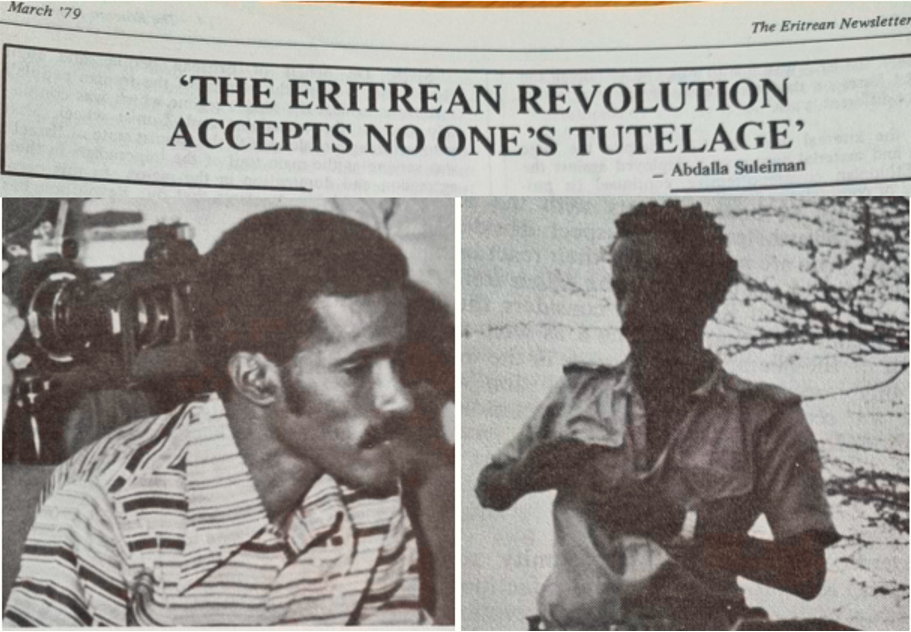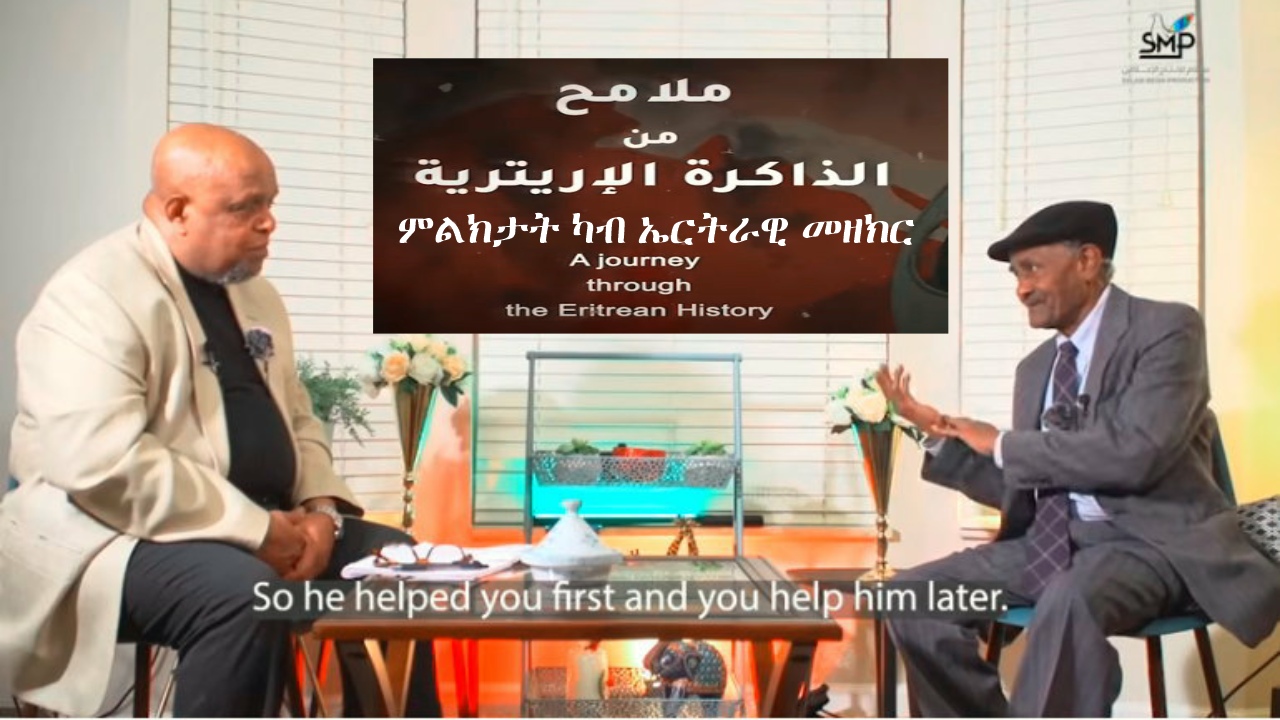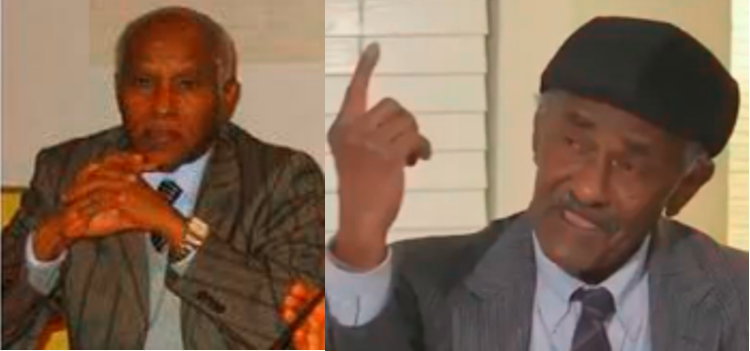17/04/2023 18:35 PM
A Secret that ELFs Ahmed Nasser
was buried with.
ስዉእ ኣሕመድ ናስር ሒዝዎ እተቐብረ ዓቢ ሃገራዊ ምስጢር።
By W/Ammar and G/Zemichael (ብ'ወልደየሱስ ዓማርን፡ ግርማይ ዘሚካኤልን። )

Former ELF Chairman Ahmed Nasser and his Foreign Office head, Abdalla Suleiman.
A secret that eLF’s ahmed Nasser
Was Buried With Nine Years Ago
(By W/Ammar and G/Zemichael)
As many friends, relatives and ex-members of the Eritrean Liberation Front (ELF) solemny commemorated the 9th anniversary of the passing away of its former chairman Ahmed Nasser these days, a highly reliable source has disclosed a huge secret that Ahmed Nasser was buried with.
The plan was a proposed massive military support to the ELF in 1979 to push out Isaias Afeworki’s Eritrean People’s Liberation (EPLF) from Eritrea. The initiators of the plan were progressive forces friendly to the then-Soviet Union and the military junta of Mengistu Hailemariam in Ethiopia. However, Ahmed Nasser and his comrade Abdalla Suleiman categorically rejected the plan that had been kept secret for the past 45 years from the Eritrean people.
But imagine what EPLF’s Isaias Afeworki could have done with such a dangerous proposal against another national force? (We will come back to the question later in this article).

Details of this long-kept secret plan were revealed in a recent interview by the Adal window in Selam Media with Abdalla Suleiman, a former ELF foreign relations head. (Ghirmai Zemichael, one of the authors of this article you are reading, was the transllator to Tigrigna of the 8 series of Selam Media interviews conducted in Arabic by Eritrean juornalist, Ibrahim Idris.)
The Adal window in the Selam Media appears to have known hints of the existence of this secret plan. Accordingly, it posed the question to Abdalla Suleiman in the interview to clarify if he so wished or could.
In response, Abdalla Suleiman clarified as follows: “Yes, the plan was proposed to us but only via the then Prime Minister of South Yemen, Ali Nasser Mohammed.” Upon an invitation by the Yemeni Prime Minister sometime in 1979 (date and month not mentioned), Abdalla Suleiman said he and a colleague at the ELF office in Yemen, Idris Humedai, went to met the Prime Minister who told them as follows:
"The EPLF is a dangerous element to the region; to progressive forces in the region as well as to you the ELF. [In this regard], consultatons have been conducted with different actors, and the best solution reached was the getting rid soon of the EPLF. For you the ELF to do this, we are ready to provide you with sufficient quality weapons, food supplies and finances that our capacities can allow. You can submit a detailed list of needed weapons to our ambassador in the Sudan as soon as possible. And if you agree, we can even help you establish contact with the Ethiopian military staff."
Abdalla Suleiman said he personally could not accept the proposal and told the Yemeni leader that “this was not a good idea.” He said he added: “Although the ELF has the supremacy of human resources with up to 35,000 militias, the differences between us and the EPLF are not that big. Secondly, the EPLF is also [by now] an organization with a large number of followers.” The South Yemeni Prime Minister is said to have expressed displeasure with the immediate response he received but proposed that the proposal can be tabled to the ELF leadership as a whole.
Abdalla Suleiman soon flew to Khartoum and saw the Yemeni ambassador who repeated to him the same message, adding the advice that the ELF “better not lose this opportunity”. The ambassador also expected to receive soon a detailed list of quality weapons.
In the recent interview with Selam Media, Abdalla Suleiman went on as follows: “[From Khartoum] I proceeded to the liberated areas in Eritrea with this dangerous idea and decided to keep it in a narrow circle. I met Chairman Ahmed Nasser [alone] and told him the message, adding that I personally do not support the idea. On his part, Ahmed rejected the idea outright. Both of us concluded that if we in the ELF today liquidate for them a force fighting the enemy on our side, they will tomorrow turn on us and liquidate us. Thus, we decided [to dump it and] keep it only to ourselves. Thus, it remained a well-kept secret [to this day].”
When the interviewer Ibrahim Idris insisted as to why Abdalla did not at least inform Ibrahim Mohammed Ali, the chairman of ELF’s secret Labour Party, Abdalla Suleiman answered: “I told you the issue was too dangerous [even to talk about it] and we preferred to keep it in total secrecy.” In this manner, the proposal of “progressive” forces of the late 70s to liquidate the EPLF by using the ELF army was rejected by two top ELF leaders who did not even wish to share it with other members of the ELF leadership.
Back to EPLF’s Isaias and a possible offer to him of such a plan
The two authors of this article, and probably the majority of Eritreans with basic political awareness, can have no doubt today that Isaias Afeworki could have happily welcomed and implemented that evil plan with or without the consent of his colleagues in the EPLF of 1979.
In fact, historical records attest that the current president of Eritrea, from his early days had the dream of liquidating the ELF, a dream that he finally realized in 1980 with the blessing and support of some neighboring Arab states and an Ethiopian ally at the time.
In the late 70s, the false message Isaias and his narrow circle conveyed to the Eritrean public was that the ELF breached the 20 October 1977 agreement and its follow-up accords reached between the two fronts. Isaias and team also successfully concocted a serious accusation in 1980 claiming that the ELF had “totally betrayed” the Eritrean cause. That accusation misled even some ELF fighters of that time. But pieces of recorded evidence started emerging to prove that the very opposite was true.
As observers of the Eritrean situation may recall, the 20 October 1977 agreement and its follow ups established that the ELF and the EPLF were “the sole and legitimate representatives of the Eritrean people” and that a Joint Supreme Political Command representing both fronts should be “the only organ authorized by the Eritrean people” to hold negotiations with the enemy “and settle all matters relating to the future of the Eritrean people and Revolution.”
To the contrary, as declassified East German and Soviet documents of the late 1970s and the Selam Media interviews with Abdalla Suleiman confirm, it was the EPLF leadership that breached those accords and negotiated in secret with the Ethiopians under the auspices of the Soviets and their allies. The said documents show that the EPLF met with the Ethiopians in East Berlin in December 1977, only six weeks after the October 20 1977 agreement was signed.
Again in January and March 1978, Isaias Afeworki and the Ethiopians were revisiting Berlin secretly for negotiations on the future of Eritrea. It was during those visits that the EPLF strong-man Isaias told the East German leader, Eric Honecker, that he was proud of holding “historic” meetings with the Ethiopian delegations headed by Ethiopian foreign minister Berhanu Bayu. Isaias also promised Honecker that his front will “not to be picky” in minor questions and that the EPLF’s “only pre-condition” for the negotiations is good will on both sides.
In one of those meetings, Honecker reminded Isaias that the there were other two fronts in the Eritrean field. As quoted in Dr. Gaim Kibreab’s new book on the documents, Isaias replied: “...It is true that we are not the only organization. That however does not worry us. Because of our great influence and military strength, we can succeed. …. The other two organizations in Eritrea have allied themselves with imperialism and the reaction in the Arabic region.”
But not only that. Isaias went on telling Honecker that “Eritrea has manly enemies within and without. If they all find out about [these secret meetings], we will have many difficulties. But we are preparing for it.” That preparation alluded to could indeed be the military plan Isaias had against the ELF and launched it in the summer of 1980.
Back to Abdalla Suleiman’s interview: When asked by Selam Media about ELF’s visit to East Berlin, Abdalla Suleiman said that it was a hastily arranged invitation by the East Germans after the EPLF delegation headed by Isaias Afeworki held three days of meetings with the Ethiopians and the East Germans. The former ELF foreign relations head tells the details of the invitation to Berlin as follows:
“While I was in Damascus, the head of our Khartoum office, Martyr Eyob Besirat told me on the phone that an important personality wanted to see me soon. I flew to Khartoum the next day and discovered that the man looking for me was Abbas Zeki, the PLO office head in Khartoum. After a call to him, he came to our Khartoum office and told me it was not he but the East German Ambassador that wanted to see me. We went to the Embassy and the Ambassador told us that negotiations were underway in Berlin between the EPLF and the Ethiopians and that East Germans want us to join the meeting.
“My response was that the ELF was not ready to join a meeting unknown to it and one that had been conducted for the last three days. On the contrary, per our 20 October agreement, any negotiation with Ethiopia must be conducted by our joint committee for such a dialogue. However, I had a pre-programmed schedule to meet the East German Communist Party and I told the Ambassador that I will go to Berlin soon. I returned to Damascus and formed my delegation that included Azien Yassin, Saleh Eyay and Yohannes Zeremariam. We fly to Berlin and upon our arrival, EPLF’s Ramadan Mohammed Nur came to our hotel and gave us a 58-page EPLF memorandum that they had submitted to the Ethiopian delegation. Ramadan also told us that their delegation was leaving that same day.
“An hour later, East Germans come to us and gave us a 68-page memorandum submitted to the Ethiopians by the EPLF. The Germans then asked us if we could meet with the delegation of the Ethiopian ruling party headed by foreign minister Berhanu Bayu. We accepted their request. [When we met] Berhanu Bayu started the talks with a harangue, accusing us of having rejected their 9-point proposal for a peaceful solution, and alleged that we were aligned with reactionaries and with America. On our response, we stated that Eritrea was not part of Ethiopia and that the Eritrean struggle was just and legitimate. The meeting ended in this manner, and we returned to Damascus the next day, dropping our pre-arranged plan of meeting the East German Communist Party.”
Abdalla Suleiman also recounted as follows the reaction of Isaias when his delegation left Berlin and returned to Middle East.
“…Upon his return to Damascus, Isaias immediately went to Beirut and tried to meet Yasser Arafat at the PLO office. But Arafat said he was busy and delegated Faruk Khadumi [senior Fatah leader] to meet him. [At the meeting], Isaias told Khadumi as follows: ‘The reason I wanted to meet Arafat is that we [the EPLF] conducted negotiations with the Ethiopians alone and we [assume] that the ELF are in a state of alert. Therefore, to avoid an unnecessary conflict, we want you to mediate between the two of us [to settle the matter].’ The final response of Yasser Arafat [and his colleagues] was that the case was beyond their capacity to handle, and instead recommended the requested mediation to be led by Yemeni leadership with the support of the PLO. The mediation was thus handled by top Yemeni leaders in Aden that included President Salman Rubei’a Ali; Prime Minister Ali Nasser Mohammed, and Abdul-Fatah Ismail, head of the Socialist Party of Yemen Thus they pressured us [ELF and EPLF] to return anew to the 20 October 1977 Agreement… Before the start of the meeting, the Yemeni PM [Ali Nasser Mohammed] asked Ahmed Nasser if any negotiation was conducted [with the Ethiopians] and Ahmed Nasser responded that the ELF side was not aware of any negotiation.”

ELF Chairman Ahmed Nasser passed away in Sweden on 26.03.2014, and his former colleague Abdalla Suleiman lives in USA
See also Related ምስዚ ዝተኣሳሰር:-
See also Related / ምስዚ ዝተኣሳሰር ሓበሬታ፡-
- Snitna YouTube - ስኒትና ዩቱብ ቻነል።
- Snitna Network and Sinit Seminars Directory. ብ`ስኒትና ከምኡ`ውን ስኒት ዝተኻየዱ ሰሚናራት።
- Snitna FaceBook - ስኒትና ፌስቡክ።
- Sinit YouTube - ስኒት ዩቱብ ቻነል።
- ዘተ ንሓባራዊ ንቕሓት
Dialogue for Common Awareness
مجموعة الحوار للوعي المشترك - ሌላ ምስ
ፖለቲካዊ ሰልፍታትን ህዝባዊ ምንቅስቓሳትን ኤርትራ፡
Eritrean Political parties and Civic movements.s
مقدمة في الأحزاب السياسية والحركات المدنية الإريترية - ኣስተምህሮ፡ መስርሕ ምንዳፍ ቅዋም ኤርትራ - The Eritrean Constitution Making Process
Seminar by Dr Bereket Habte selassie. ኣስተምህሮ፡ ብ`ዶር. በረኸት ሃብተስላሰ። - ሲምፖዝዩም ኤርትራ (Eri-Platform: 2018 - 2020)
- ዋዕላ ህንጸት ዲሞክራሲ ኣብ ኤርትራ Building Democracy in Eritrea Conference (Eritrea Focus: 2019 - 2020)
- Enough is enough! ይኣክል ምልኪ! ማዕበል ድምጺ ህዝቢ لقد طفح الكيل
- A Look Back on Eritrea’s Historic 1993 Referendum, BY FIKREJESUS AMHAZION (PhD)
ታሪኻዊ ውጽኢት ረፈረንዱም ኤርትራ 1993 ብፍቕረየሱስ ኣምሃጽዮን (ዶ/ር)) (TesfaNews APRIL 23, 2018). - ሃገራዊ ቻርተር ኤርትራ - ኣብ 3ይ ጉባኤ ህ.ግ.ሓ.ኤ: ዝጸደቐ (ናቕፋ 10 - 16 ለካቲት 1994)።
- PFDJ NATIONAL CHARTER Adopted by the 3rd Congress of the EPLF/PFDJ Naqfa, February 10-16, 1994.
- ንዝኽሪ ግዳያት ዲክታቶሪያዊ ምሕደራ ኤርትራ። In memory of Victims of Dictatorial Administration in Eritrea.
- G-15:- ቅልዕቲ ወረቐት ናብ ህዝቢ ኤርትራ፡ ኣገደስቲ እዋናውያን ጉዳያት፡ (ኣስመራ፡ ነሓሰ 3፡ 2001)
- G-15:-Open Letter To The People of Eritrea (Asmara, August 3, 2001)
- G-15:-ቅሉዕ መልእኽቲ ናብ ኩሎም ኣባላት ህግደፍ
- G-15:-Open Letter to All PFDJ Members (Audio) ቅሉዕ መልእኽቲ ናብ ኩሎም ኣባላት ህግደፍ (ብድምጺ)
- G-15:-Open Letter to All PFDJ Members
- GI: ህጹጽ ጻውዒት ንኹሎም ኣብ መላእ ኵርናዓት ዓለም ዝርከቡ ኤርትራውያን። An Urgent Call to All Eritreans Worldwide. المبادرة العالمية لتمكين الحركة الشعبية الاريترية
- ድምጽና (Our Voice)
- መደብ ንጋባእ ENGAGE ERITREA!
- Advice for All Eritreans ምኽሪ ንኹሎም ኤርትራውያን
- Human Rights in Eritrea / ኩነታት ሰብኣዊ መሰላት ኣብ ኤርትራ፡
- UN - Commission of inquiry on Eritrea / ናይ ውሕሃ መርማሪት ኮሚሽን ሰብኣዊ መሰላት ኤርትራ፡
- Mike Smith / ሚስተር ማይክ ስሚዝ፡ ኣቦ ወንበር መርማሪት ኮሚሽን ሰብኣዊ መሰላት ኤርትራ፡
- Also see: "UN - COI on Eritrea / ናይ ውሕሃ መርማሪት ኮሚሽን ሰብኣዊ መሰላት ኤርትራ፡
- UN COMMISSION OF INQUIRY ERITREA (COI-ERITREA) And POPULAR RESPONSES
- ጸብጻብ መርማሪት ኮሚሽን ሰብኣዊ መሰላት ኤርትራ፡ ህዝባዊ ግብረ-መልሲን
- ጸብጻብ መርማሪት ኮምሽን ኵነታት ሰብኣዊ መሰላት ኣብ ኤርትራ – ዘይወግዓዊ ትርጉም (ብትግርኛ)

